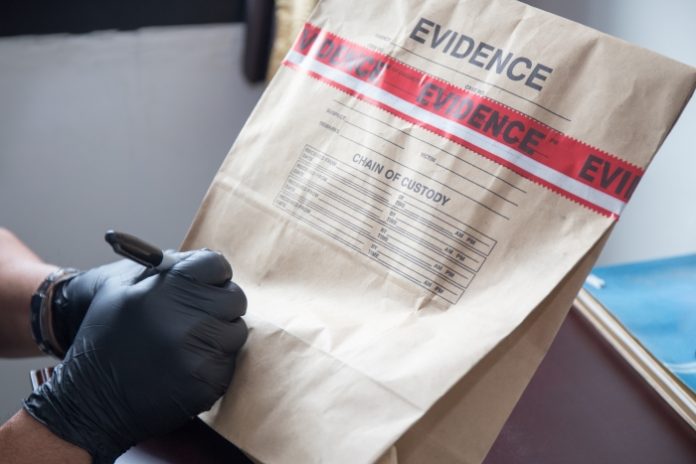Prosecutions involving more than a dozen homicides and more than 100 sexual offences collapsed before trial in England and Wales last year as a result of lost or missing evidence, the Guardian has learned.
The findings, obtained by a freedom of information (FoI) request by criminal justice researchers, raise concerns about police handling of crucial evidence used to prosecute the most serious crimes, such as DNA samples, CCTV footage, weapons, drugs and mobile phone data.
The figures show that lost or unavailable materials were responsible for the pre-trial collapse of 7,316 cases between September 2021 and September 2022 in forces across England and Wales, including 16 homicides (1.3% of the total number of homicides) and 123 sexual offences (1%).
In the previous three years, between October 2018 and August 2021, 20,838 cases were dropped, including 42 homicides (1.1% of the total) and 364 sexual offences (1.2%).
“This is the stark reality of a criminal justice system with massive holes in it,” said Prof Carole McCartney, a criminologist at the University of Leicester. “If you’ve lost the evidence, you can’t prosecute people, you can’t appeal if you’re wrongly convicted, you can’t solve a cold case.”
The figures, obtained by McCartney and Louise Shorter, an independent criminal justice researcher, come as the police and the Criminal Cases Review Commission (CCRC) face intense criticism over the handling of scientific evidence in the Andrew Malkinson case.

Malkinson was exonerated last month after spending more than 17 years in prison for a rape he did not commit, despite another man’s DNA being found on the victim’s clothing in 2007.
In response to the findings, the National Police Chiefs’ Council noted that the data related to cases in which evidence was “lost” and a range of other scenarios in which evidence that could include expert witness statements or social services material was “unavailable” to police or the Crown Prosecution Service (CPS).
In March, the damning Casey report on standards and culture in the Metropolitan police highlighted the “dire state” of scientific evidence storage, describing “overstuffed, dilapidated or broken fridges” and a freezer breaking down in the 2022 heatwave, resulting in all the evidence within being destroyed and associated rape cases being dropped.
In anonymised interviews with current and former officers, due to be published in the International Journal of Police Science and Management, McCartney and Shorter heard of problems in police forces across England and Wales.
One officer likened police forensic evidence storage to a bargain retailer, saying: “I suppose it’s like dealing with Primark … everything’s just stacked really high and something will get lost somewhere along the line. If you went to a more high-end store, they’ve got very few things and everything’s meticulously audited.”
Other incidents described by officers included:
- A kilogram of heroin being left unsecured on an office desk for several days until the officer responsible returned to the office.
- Exhibits being left unsealed in drawers and under desks.
- Freezers so critically overloaded that they “were acting more as storage facilities rather than frozen storage”.
“The Met’s problems are replicated across the country,” said McCartney. “This is all going on behind closed doors. The police [custody of forensic scientific evidence] is not monitored, they aren’t regulated, nobody inspects this. It’s critical to the criminal justice system, yet nobody is paying any attention.”
As of this year, the government’s Forensic Science Regulator has statutory powers to close private labs that do not meet quality standards. However, the powers do not extend to oversight of the custody of scientific evidence by police forces before and after trial.
Prof Peter Gill, a pioneer in DNA fingerprinting and a researcher at the University of Oslo, said the crisis had its origins in the closure of the Forensic Science Service in 2012, which shifted responsibility for the retention of scientific evidence from a centralised archive to the country’s 43 police forces.
“It just shows how badly things go wrong when you go all out commercial. No other country in the world does this, for very good reason,” he said.
“Everybody knows that this is going on. Judges know about it, the police know about it, everybody in the criminal justice system knows about it,” he added. “But things have to collapse before politicians take any notice. It’s awful.”
In response to the CPS data on dropped cases, Prof Denise Syndercombe Court, a forensic geneticist at King’s College London, said: “They’re extraordinary numbers. It’s appalling.”
Syndercombe Court called for the reinstatement of a national forensic science archive to retain exhibits and evidence for the most serious crimes.
“I have some sympathy with the police,” she said. “They get everything sent back to them, a huge number of items that should be frozen, and securing and cataloguing all that stuff must be difficult. Nevertheless, that should be done.”
A spokesperson for the National Police Chiefs’ Council said: “Police and the CPS work together to ensure evidence is gathered and presented in a timely manner. When evidential issues occur in a case, the CPS will raise this with police for any action deemed necessary.”
(Source: The Guardian)










